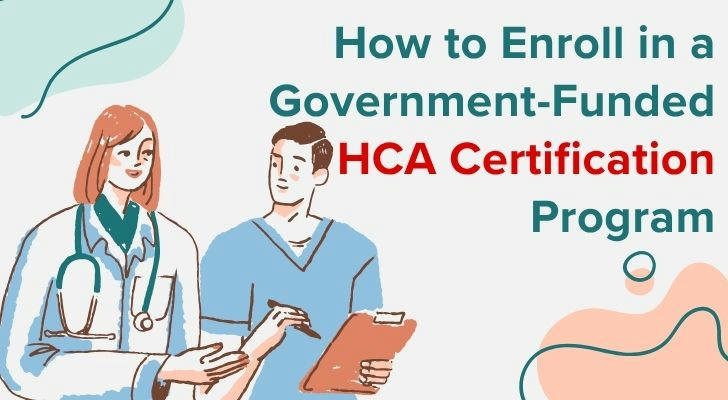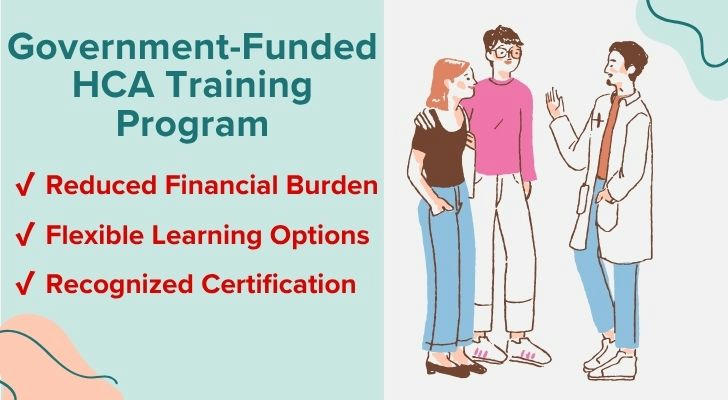Understanding Government-Funded HCA Certification in Canada
Government-funded HCA certification programs help individuals enter the healthcare field by offering accessible, affordable training across Canada.

What is Involved in Government-Supported HCA Courses?
Government-supported HCA courses are structured to prepare students for the physical, emotional, and technical aspects of caregiving. They focus on building both foundational knowledge and practical skills needed in hospitals, long-term care facilities, assisted living centers, and private homes. A typical curriculum includes:
Personal Care Support – Assisting clients with daily living activities such as bathing, grooming, dressing, toileting, and mobility support.
Basic Medical Knowledge – Learning to recognize common health conditions, practice infection control, monitor vital signs, and support medication routines under supervision.
Effective Communication – Developing respectful and professional communication strategies with patients, families, and healthcare teams, especially when addressing sensitive issues.
Health & Safety Protocols – Understanding emergency response procedures, safe lifting techniques, fall prevention, and how to maintain a secure care environment.
In addition to theory, most programs—especially online Health Care Aide certificate options—include clinical placements or practicum components, which allow students to apply their skills in real healthcare settings under supervision. This hands-on experience is essential for building confidence and meeting certification requirements.
Why Choose a Government-Funded HCA Training Program?
Choosing a government-funded HCA training program—whether online or in person—offers key advantages that make the path to becoming a Health Care Aide more accessible and practical.
✔ Reduced Financial Burden
Many government-supported HCA courses are funded by provincial or federal initiatives. These subsidies can cover tuition, textbooks, uniforms, and even clinical placement costs. For eligible students, this significantly reduces the financial pressure typically associated with post-secondary education.
✔ Flexible Learning Options
Programs are available in various formats—including in-class, hybrid, and fully online government-funded HCA programs—which allows students to tailor their learning around work, family, or personal commitments. This flexibility is especially valuable for adult learners or those living in rural areas with limited access to in-person training.
✔ Recognized Certification
Upon completion, graduates receive an official Health Care Aide certificate that is recognized by provincial health authorities and required for employment. These credentials ensure that students meet the standards set by healthcare regulatory bodies and are eligible for roles in hospitals, long-term care facilities, assisted living centers, and home care environments.

Notable HCA Training Providers in Canada
🟢 NorQuest College (Alberta)
Based in Edmonton, NorQuest College provides government-funded HCA certification through both in-person and online formats. Its program follows Alberta’s provincial curriculum and includes clinical placements to ensure hands-on experience. NorQuest is listed in the Alberta HCA Directory and is known for strong student support and close ties to healthcare employers.
Other Institutions
◾ Vancouver Community College (BC) – Approved by the BC Care Aide Registry.
◾ Centennial College (Ontario) – Offers hybrid learning and job placement support.
◾ Nova Scotia Community College (NSCC) – Known for practical training and regional recognition.
◾ Students can explore local options by checking provincial health websites or contacting accredited colleges directly.
How to Apply for an HCA Training Program
Applying to an HCA training program—especially those that are government-funded—usually involves a clear, step-by-step process. While specific requirements may vary by province or institution, most applicants can expect the following:
1️⃣ Review Eligibility
Prospective students should check the minimum entry requirements. These often include:
◾ A high school diploma or equivalent (some programs may accept mature students without a diploma)
◾ A recent criminal background check and vulnerable sector screening
◾ Proof of immunizations (e.g., MMR, Hepatitis B, COVID-19)
◾ Basic English language proficiency (especially for online Health Care Aide certificate programs)
Eligibility criteria are typically listed on the training provider's website or through provincial health education portals.
2️⃣ Submit an Application
Applications are submitted directly to an accredited college or institution offering government-supported HCA courses. Many schools provide online application portals and step-by-step guides.
3️⃣ Attend Information Sessions or Assessments
Some programs require applicants to attend an information session to better understand the course structure and expectations. Others may request:
◾ Academic readiness assessments
◾ Language or communication skill evaluations
◾ Personal interviews (particularly for competitive placements)
These steps help ensure applicants are well-prepared for both the academic and practical components of the program.
4️⃣ Begin Your Training
Once accepted, students choose their preferred format—in-person, hybrid, or online Health Care Aide certificate programs. Training typically includes both classroom instruction and clinical placements, scheduled according to program design and local healthcare facility availability.
Applicants are encouraged to apply early, as government-funded HCA training programs may have limited seats and fill up quickly due to high demand.
Final Thoughts
With multiple government-supported HCA courses available across Canada, entry into the healthcare sector has become more accessible than ever. Whether through in-person classes or online government-funded HCA programs, these initiatives lower cost barriers and help learners build a meaningful career in care and support.

